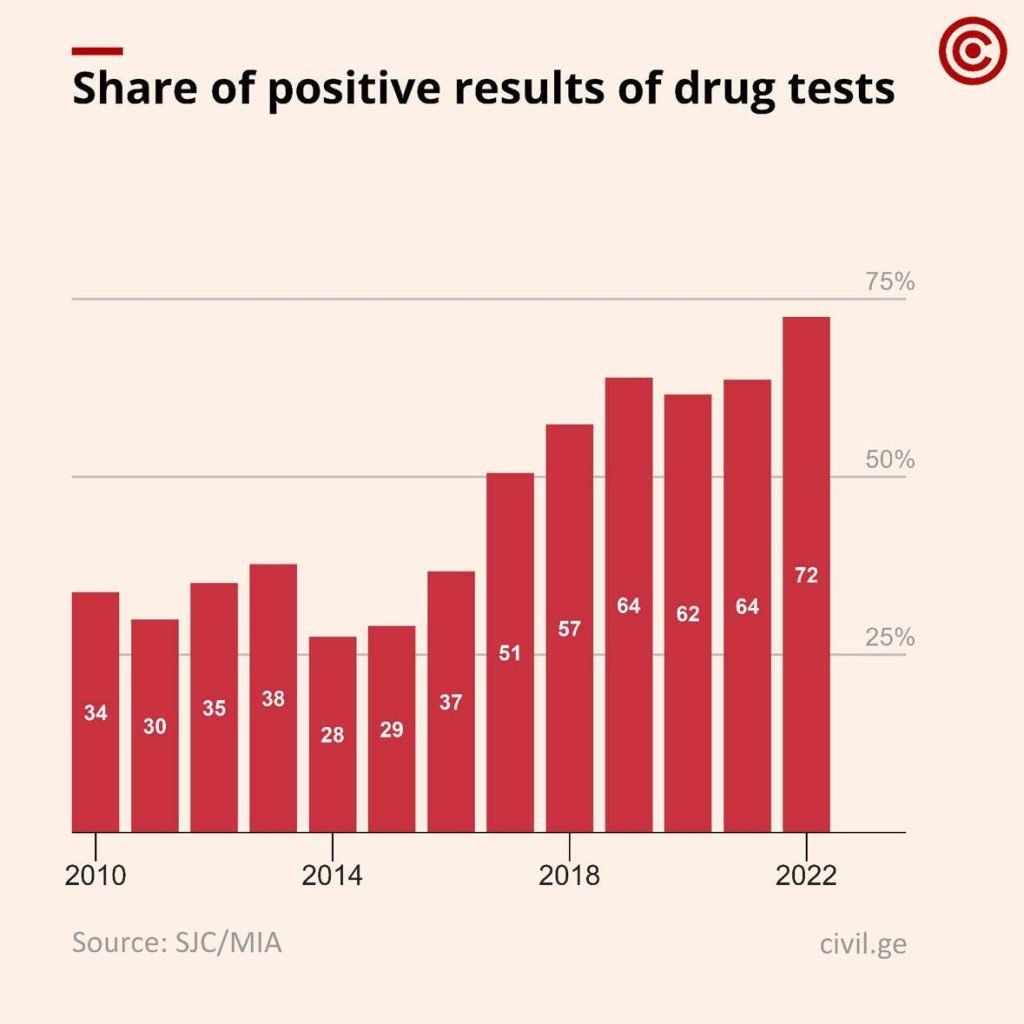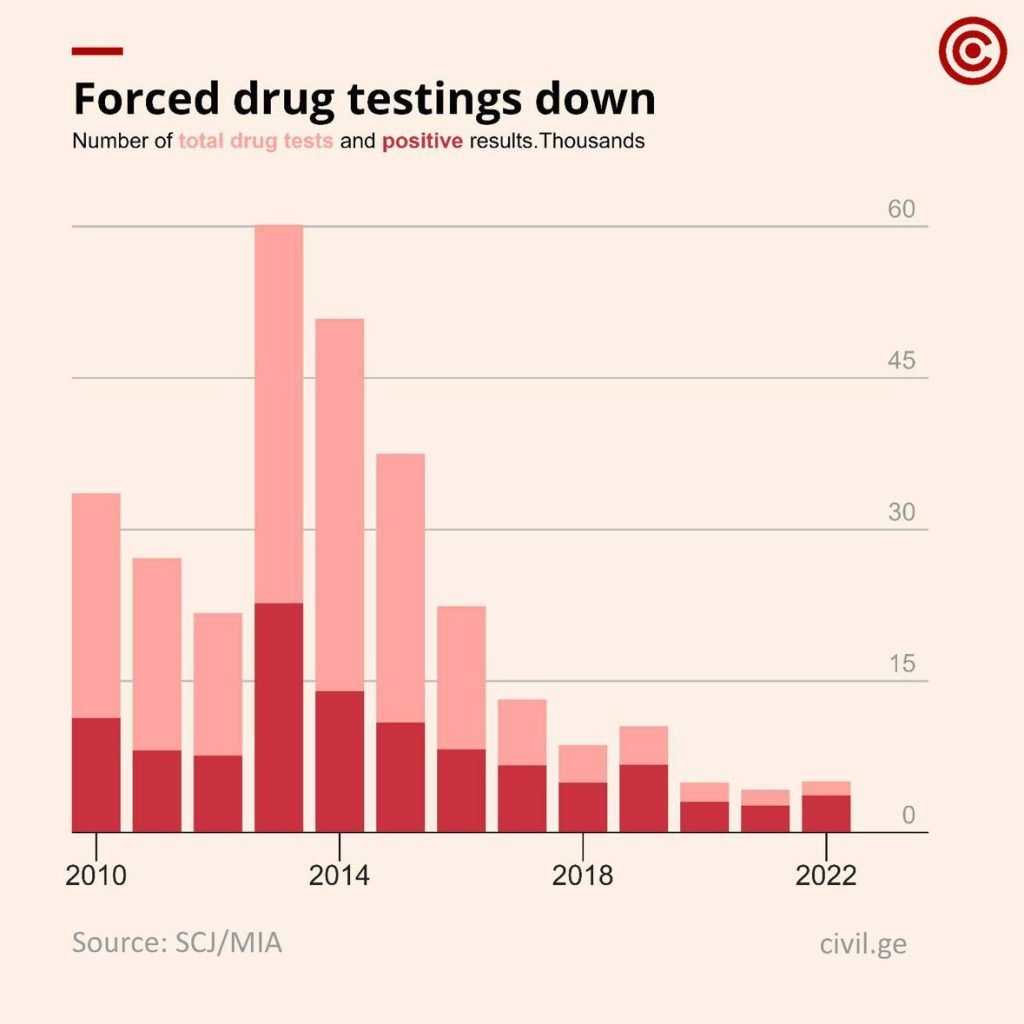
Local Watchdog on Drug Policy Trends in 2022 Reveals Continued Emphasis on Punitive Measures
The Social Justice Center’s issued annual report on the drug situation and drug policy trends Georgia in 2022. In addition to identifying key challenges, the report makes recommendations to better protect the rights of individuals accused or convicted of drug-related crimes and those struggling with substance use disorders.
The report highlights the key aspects of Georgia’s drug policy in 2022:
- Continued emphasis on punitive measures rather than prevention;
- Lack of substantive changes to drug legislation;
- Delayed implementation of Constitutional Court rulings;
- Incomplete and problematic data from public agencies on drug-related crimes;
- Delayed review of several significant constitutional complaints/referrals related to drug crimes are registered in the Constitutional Court;
- 41% increase in registered drug-related offences in 2022 compared to 2021;
- Slight decrease in drug-related prosecutions compared to pre-pandemic levels;
- Conditional sentences most common for convictions (66% of cases);
- Increase in drug testing and positive results (72% increase);
- Increasing number of presidential pardons for drug-related convictions (25 in 2022);
- Challenges in accessing opioid substitution therapy and naloxone, the first-line opioid overdose reversal drug.
The Social Justice Center requested information from the pharmacy chains about the total amount of Naloxone imported and sold by the them during the reporting period. However, none of them responded. Considering the vital importance of Naloxone, the Social Justice Center calls on the Ministry of Internally Displaced Persons from the Occupied Territories, Labor, Health and Social Affairs of Georgia to ensure the availability of the drug through communication and advocacy with pharmacy chains.


The report underlines concerns about “street drug testing,” stating: “it remains an unethical and repressive mechanism, posing risks of an unjustified interference with privacy rights”. It’s noted that the Public Defender of Georgia applied to the Constitutional Court and demanded repealing the norms regulating “street drug testing” in 2015. However, the court has not yet assessed the constitutionality of the contested norms.
Article 3 of Georgia’s “Law on Combating Drug-related Crime” automatically removes certain civil rights from individuals convicted of drug-related offenses. In contrast, the forfeiture of rights for administrative offenders is determined by a judge. The affected rights include driving a vehicle, practicing medicine or managing a pharmacy, practicing law, working in education and public institutions, passive voting rights, and owning weapons. The law applies to drug users, dealers, facilitators of drug-related activities, those facilitating the spread of narcotics, and administrative offenders committing specific cannabis-related offenses. Deprivation of rights varies depending on the offense, ranging from 3 to 20 years.
The Social Justice Center believes that the legislation concerning the deprivation of rights is deeply problematic in both respects – for those convicted of drug-related crimes and administrative (misdemeanor) offenders. Instead of a one-size-fits-all, “the judge reviewing the case should have the opportunity to assess the necessity and appropriateness of depriving convicts of their rights, taking into account individual circumstances.”
Georgia has two opioid substitution therapy (OST) programs, Methadone and Suboxone, with over 12,000 beneficiaries participating as of July 2022. Despite the growing numbers, the utilization of OST programs in Georgia faces challenges, particularly in terms of geographical accessibility. While 22 substitution therapy centers are operational, regions like Kvemo Kartli and Racha-Lechkhumi are underserved. A beneficiary satisfaction survey highlights barriers related to the daily visits to the centers. As a result, the Social Justice Centre, experts and international organizations suggest that stable beneficiaries should be offered the option of multi-day doses to increase the effectiveness of treatment.
In the absence of the political will necessary for systemic reform, the Social Justice Center calls on the authorities to take at least the following steps to improve the drug situation and humanize the drug policy:
The Parliament of Georgia:
- Implement the activities of the Drug Action Plan for 2021-2022 – implement relevant legislative amendments and timely review of bills that are already initiated in the Parliament;
- Implement appropriate legislative amendments to the Criminal Code towards its harmonization with the Constitutional Court rulings;
- Revoke the possibility of deprivation of rights for administrative offenders granting judges with discretionary powers in criminal sentencing.
The Constitutional Court of Georgia:
- Timely review the constitutional complaints and referrals for drug relates crimes and administrative offenses.
The Ministry of Internally Displaced Persons from the Occupied Territories, Labor, Health and Social Affairs of Georgia:
- Make opioid substitution programs widely accessible and improve existing services;
- Take steps to replenish the supply of Naloxone in pharmacy chains.
The Ministry of Education and Science of Georgia and the Office of Resource Officers of Educational Institutions:
- Within the framework of strengthening primary prevention, expand the circle of beneficiaries involved in evidence-based prevention programs;
Member agencies of the Inter-agency Coordinating Council for Combating Drug Abuse:
- Improve the quality of accessibility to public information;
- Improve methods of collecting and processing statistical data;
- Record the statistics concerning the deprivation of civil rights for administrative offenses.
This post is also available in: ქართული Русский